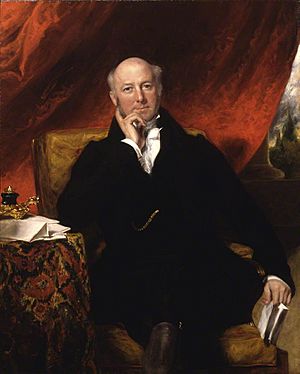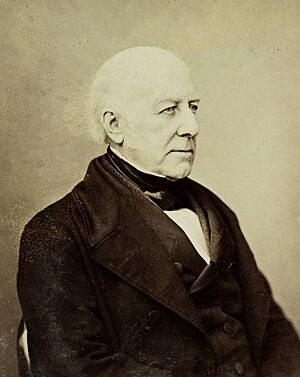Sir Charles Mansfield Clarke, 1st Baronet facts for kids
Quick facts for kids
Sir
Charles Mansfield Clarke
1st Baronet
|
|
|---|---|

Portrait by Samuel Lane, 1832
|
|
| Born | 28 May 1782 London
|
| Died | 7 September 1857 (aged 75) Marine Parade, Brighton
|
| Nationality | British |
| Education | St Paul’s School (London) |
| Alma mater | Hunterian School of Medicine |
| Known for | Surgeon |
| Title | Baronet |
Sir Charles Mansfield Clarke (born May 28, 1782 – died September 7, 1857) was a famous British surgeon. He was highly respected in London and Norfolk for his medical skills. Charles followed in his father's footsteps, who was also a surgeon. His brother, John Clarke, was a well-known doctor too.
Contents
Early Life and Family
Charles Mansfield Clarke was born in London. His parents were John Clarke and Biddy Mansfield. In 1806, he married Mary Anna Squire. They started their family together. Charles later became a grandfather to another famous person, Sir Charles Mansfield Clarke, who was a general.
Becoming a Doctor
Charles went to St. Paul’s School in London. He then studied medicine at St George's Hospital. He also attended the Hunterian School of Medicine. In 1827, he earned his Doctor of Medicine degree.
After finishing his studies, Charles worked as a surgeon. He spent two years helping soldiers in the Hertfordshire Militia. Later, he worked with the 3rd Foot Guards.
Specializing in Care
His brother convinced him to focus on a special area of medicine. Charles became an expert in midwifery (helping women during childbirth). He also treated diseases that affected women and children.
Charles received special honors for his work. In 1825, he became a Fellow of the Royal Society (FRS). This is a group of very important scientists. In 1836, he also became a Fellow of the Royal College of Physicians (FRCP). This showed he was a top doctor.
Royal Physician and Baronet
Sir Charles became the personal doctor to Queen Adelaide. She was the wife of King William IV. Because of his important role, he was given a special title. On September 30, 1831, he became a baronet. This means he was given a title of honor by the King, making him "Sir Charles." His title was "of Dunham Lodge, in the County of Norfolk."
Important Medical Work
From 1804 to 1821, Charles taught many classes. He gave lectures on diseases that affected women. In 1814 and 1821, he published his most important book. It was called "Observations on those Diseases of Women which are attended by Discharges." This book shared his knowledge with other doctors.
He also worked at Queen Charlotte’s Lying-In Hospital. This hospital helped women who were having babies. Charles also helped start the Westminster Medical Society. This was a group where doctors could share ideas.
See also
- John Clarke (physician, 1761–1815), his brother
 | Percy Lavon Julian |
 | Katherine Johnson |
 | George Washington Carver |
 | Annie Easley |


